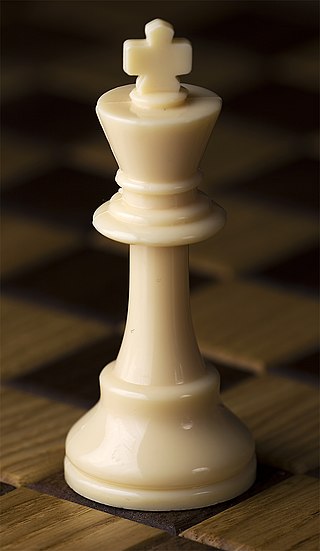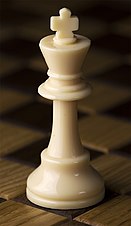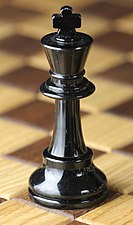King (chess)
Chess piece From Wikipedia, the free encyclopedia
The king (♔, ♚) is the most important piece in the game of chess. It may move to any adjoining square; it may also perform, in tandem with the rook, a special move called castling. If a player's king is threatened with capture, it is said to be in check, and the player must remove the threat of capture immediately. If this cannot be done, the king is said to be in checkmate, resulting in a loss for that player. A player cannot make any move that places their own king in check. Despite this, the king can become a strong offensive piece in the endgame or, rarely, the middlegame.
White king
Black king
In algebraic notation, the king is abbreviated by the letter K among English speakers. The white king starts the game on e1; the black king starts on e8. Unlike all other pieces, each player can have only one king, and the kings are never removed from the board during the game.
Placement and movement
Summarize
Perspective
Initial placement of the kings
|
Possible movements of an unhindered king
|
The king's movement may be hindered by other pieces. Black's king cannot move to squares under attack by the white bishop, knight, queen, or pawn; White's king cannot move to squares under attack by the black queen.
| ||||||||||||||||||||||||||||||||||||||||||||||||||||||||||||||||||||||||||||||||||||||||||||||||||||||||||||||||||||||||||||||||||||
The white king starts on e1, on the first file to the right of the queen from White's perspective. The black king starts on e8, directly across from the white king. Each king starts on a square opposite its own color.
A king can move one square horizontally, vertically, and diagonally unless the square is already occupied by a friendly piece or the move would place the king in check. If the square is occupied by an undefended enemy piece, the king may capture it, removing it from play. Opposing kings may never occupy adjacent squares (see opposition) to give check, as that would put the moving king in check as well. The king can give discovered check, however, by unblocking a bishop, rook, or queen.
Castling
| a | b | c | d | e | f | g | h | ||
| 8 |  | 8 | |||||||
| 7 | 7 | ||||||||
| 6 | 6 | ||||||||
| 5 | 5 | ||||||||
| 4 | 4 | ||||||||
| 3 | 3 | ||||||||
| 2 | 2 | ||||||||
| 1 | 1 | ||||||||
| a | b | c | d | e | f | g | h | ||
White has castled kingside (0-0); Black has castled queenside (0-0-0).
The king can make a special move, in conjunction with a rook of the same color, called castling. When castling, the king moves two squares horizontally toward one of its rooks, and that rook is placed on the square over which the king crossed.
Castling is permissible under the following conditions:
- Neither the king nor the castling rook have previously moved.
- No squares between the two pieces are occupied.
- The king is not in check.
- None of the squares the king would move across or to are under enemy attack.
Castling with the h-file rook is known as castling kingside or short castling (denoted 0-0 in algebraic notation), while castling with the a-file rook is known as castling queenside or long castling (denoted 0-0-0).
Status in games
Summarize
Perspective
Check and checkmate
| a | b | c | d | e | f | g | h | ||
| 8 |  | 8 | |||||||
| 7 | 7 | ||||||||
| 6 | 6 | ||||||||
| 5 | 5 | ||||||||
| 4 | 4 | ||||||||
| 3 | 3 | ||||||||
| 2 | 2 | ||||||||
| 1 | 1 | ||||||||
| a | b | c | d | e | f | g | h | ||
Black's king cannot move to squares under attack by the white bishop, knight, queen, or pawn. Since White is checking Black, and Black can neither move, capture the checking piece, nor block the check, Black is checkmated.
A king that is under attack is said to be in check, and the player in check must immediately remedy the situation. There are three possible ways to remove the king from check:
- The king is moved to an adjacent non-threatened square. A player may not castle to get their king out of check. A king can capture an adjacent enemy piece if that piece is not protected by another enemy piece.
- A piece is interposed between the king and the attacking piece to break the line of threat (not possible when the attacking piece is a knight or pawn, or when in double check).
- The attacking piece is captured (not possible when in double check, unless the king captures).
If none of the three options are available, the player's king has been checkmated, and the player loses the game.
In casual games, when placing the opponent's king in check, it is common to announce "check", but this is not required by the rules of chess.
Stalemate
| a | b | c | d | e | f | g | h | ||
| 8 |  | 8 | |||||||
| 7 | 7 | ||||||||
| 6 | 6 | ||||||||
| 5 | 5 | ||||||||
| 4 | 4 | ||||||||
| 3 | 3 | ||||||||
| 2 | 2 | ||||||||
| 1 | 1 | ||||||||
| a | b | c | d | e | f | g | h | ||
White to move: White cannot move legally because of the black queen and king. Since the king may not move into check, White is stalemated.
A stalemate occurs when a player, on their turn, has no legal moves, and the player's king is not in check.
If this happens, the king is said to have been stalemated, and the game ends in a draw. A player who has very little or no chance of winning will often, in order to avoid a loss, try to entice the opponent to inadvertently place the player's king in stalemate (see swindle).
Role in gameplay
In the opening and middlegame, the king will rarely play an active role in the development of an offensive or defensive position, with the notable exception of a king walk. Instead, it will normally castle and seek safety on the edge of the board behind friendly pawns. In the endgame, however, the king emerges to play an active role as an offensive piece, and can assist in the promotion of the player's remaining pawns.
It is not meaningful to assign a value to the king relative to the other pieces, as it cannot be captured or exchanged and must be protected at all costs. In this sense, its value could be considered infinite. As an assessment of the king's capability as an offensive piece in the endgame, it is often considered to be slightly stronger than a bishop or knight. Emanuel Lasker gave it the value of a knight plus a pawn (i.e. four points on the scale of chess piece relative value),[1] though some other theorists evaluate it closer to three points. It is better at defending friendly pawns than the knight is, and it is better at attacking enemy pawns than the bishop is.[2]
History
Summarize
Perspective

The king's predecessor is the piece of the same name in shatranj. Like the modern king, it is the most important piece in the game and can move to any neighboring square. However, in shatranj, baring the king is a win unless the opponent can do the same immediately afterward; stalemating the king is a win; and castling does not exist.
Name translations
| Language | King | Translation |
|---|---|---|
| Afrikaans | K Koning | king |
| Albanian | M Mbreti | king |
| Arabic | م مَلِك (malik) | king |
| Azerbaijani | Ş Şah | shah |
| Armenian | Ա Արքա (Ark῾a) | king |
| Basque | E Erregea | king |
| Belarusian (Taraškievica) | К кароль | king |
| Bengali | R রাজা (rājā) | King |
| Bulgarian | Ц цар | tsar |
| Catalan | R rei | |
| Chinese | K 王 (wáng) | king |
| Czech | K král | king |
| Danish | K konge | king |
| Dutch | K koning | king |
| English | K king | |
| Esperanto | R reĝo | king |
| Estonian[3] | K kuningas | king |
| Finnish | K kuningas | king |
| French | R roi | king |
| Galician | R rei | king |
| Georgian | მფ მეფე (mep'e) | king |
| German[4] | K König | king |
| Greek | Ρ βασιλιάς (vasiliás) | king |
| Hindi | R राजा (rājā) | king |
| Hebrew | מ מלך (Melech) | king |
| Hausa | S sarki | king |
| Hungarian | K király | king |
| Icelandic | K kóngur | king |
| Ido | R rejo | king |
| Indonesian | R raja | king |
| Interslavic | K kralj | king |
| Irish | R rí | king |
| Italian | R re | king |
| Japanese | K キング (kingu) | |
| Javanese | R raja | king |
| Kannada | ರಾ ರಾಜ (raaja) | king |
| Kazakh | Кр патша (patşa) | king |
| Korean | K 킹 (king) | |
| Latin | R rex | king |
| Latvian | K karalis | king |
| Lithuanian | K karalius | king |
| Luxembourgish | K Kinnek | king |
| Macedonian | K крал | king |
| Malayalam | K രാജാവ് (raajavu) | king |
| Marathi | R राजा (rājā) | king |
| Mongolian | Н ноён | noyan |
| Norwegian Bokmål | K konge | king |
| Norwegian Nynorsk | K konge | king |
| Odia | K ରଜା (rôja) | king |
| Oromo | M Mootii | |
| Persian | ش شاه | king |
| Polish | K król | king |
| Portuguese | R rei | king |
| Romanian | R rege | king |
| Russian | Кр король (korol') | king |
| Scottish Gaelic | R righ | king |
| Serbo-Croatian | K kralj (К краљ) | king |
| Northern Sotho | K Kgoši | |
| Sicilian | R re | king |
| Slovak | K kráľ | king |
| Slovene | K kralj | king |
| Spanish | R rey | king |
| Swedish | K kung | king |
| Tamil | K அரசன் (arasaṉ) | king |
| Telugu | రాజు (rāju) | king |
| Thai | ข ขุน (khun) | king |
| Turkish | Ş/K şah / kral | shah / king |
| Ukrainian | Kр король (korol) | king |
| Urdu | بادشاہ (bādshāh) | |
| Vietnamese | V vua | king |
| Welsh | T teyrn / brenin | lord / king |
Unicode
Unicode defines three codepoints for a king:
♔ U+2654 White Chess King
♚ U+265A Black Chess King
🨀 U+1FA00 Neutral Chess King
See also
- Bare king
- Chess piece
- Finial – top of king, often a monarch's
- King and pawn versus king endgame
- King's graph
- Mann – the non-royal equivalent piece
- Opposition – technique of king facing king
- Staunton chess set
Notes
References
External links
Wikiwand - on
Seamless Wikipedia browsing. On steroids.


